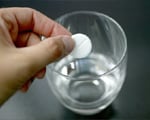People who don't believe their pain medicine will work can actually reduce or even cancel out the effectiveness of the drug, and images of their brains show how they are doing it.

To map how a person's feelings and past experiences can influence the effectiveness of medicines, researchers in U.K. and Germany used the drug remifentanil, a potent ultra short-acting synthetic opioid painkiller. Twenty two healthy participants were put in an MRI scanner and had heat applied to one leg. They were asked to rate pain on a 1 to 100 scale. Unknown to the participants, the researchers started giving the drug via infusion to see what effects there would be when the volunteers had no knowledge or expectation of treatment. The average initial pain rating of 66 went down to 55.
The participants were then told they would now start to get the drug, although no change was actually made and they just continued receiving the opioid at the same dose. The average pain ratings dropped further to 39. The participants were then told the drug had been stopped and warned that there may be an increase in pain. In reality, the drug was still being given at the same dose, but their pain intensity increased to 64 - meaning the pain was almost as bad as it had been at the beginning, before they had had any drug.
Looking at scans, it was found that the brain's pain networks responded to different extents according to the varying expectations and matched the reports of pain.
The findings suggest that even a powerful painkilling drug with a true biological effect can appear not to be working if a patient has been primed to expect it to fail. By contrast, positive expectations about the treatment can double the natural physiological or biochemical effect of an opioid drug. The effect of expectations is powerful enough to give real added benefits of the drug, but unfortunately, it is also very capable of overriding the true analgesic effect. The study also suggests that neural activity in certain brain areas can be monitored as a way to objectively gauge how well a drug is working for each patient as the brain imaging tells us that patients really are switching on and off parts of their brains through the mechanisms of expectation -- positive and negative. This work may have implications for the design of clinical trials, which often compare an experimental drug against a dummy pill to see if there is any effect beyond the placebo effect.
DoctorNDTV is the one stop site for all your health needs providing the most credible health information, health news and tips with expert advice on healthy living, diet plans, informative videos etc. You can get the most relevant and accurate info you need about health problems like diabetes, cancer, pregnancy, HIV and AIDS, weight loss and many other lifestyle diseases. We have a panel of over 350 experts who help us develop content by giving their valuable inputs and bringing to us the latest in the world of healthcare.












